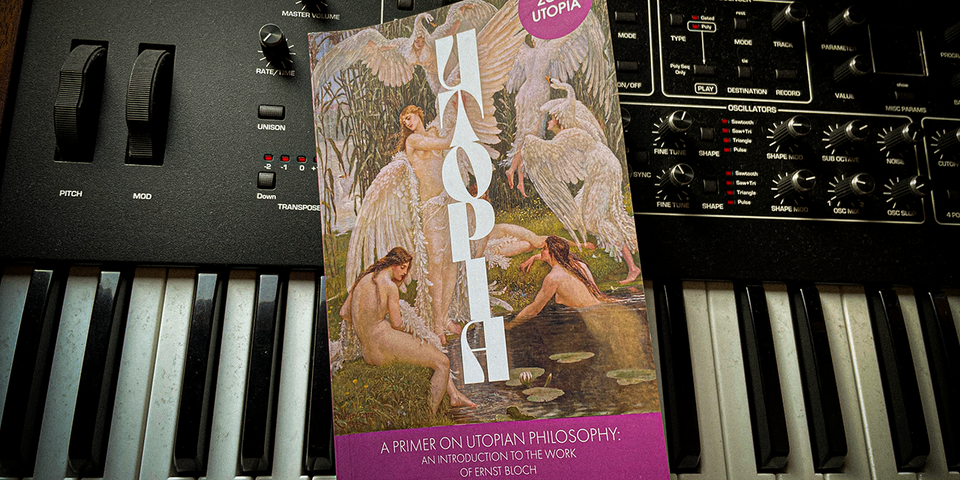I WANT TO BE HUMAN FOR THE FIRST TIME

Last week I read A Primer on Utopian Philosophy by Jon Greenaway. It’s a great, user-friendly introduction to philosopher Ernst Bloch's ideas about utopia that resonated with a lot of the work I've been doing and posting here recently. In particular, reading it right after putting out the Music Abolitionist Provocation, it felt like a lot of the book was a more sophisticated, high-fidelity articulation of some of the ideas I had been scrambling towards.
Last year I read David Graber and David Wenegrow's book Dawn of Everything and found it to be a profoundly mind-altering experience. The clarity of its argument is astonishing. At the time, Telex From MIDI City was done and shortly to be released and this book deeply informed all the lore and stubbornly utopian follow-up noise I was making in the wake of that record. I cannot begin to do it justice here, but the broad idea of Dawn of Everything is a retelling of human existence from various different perspectives across various cultures and civilisations that came long before us. Its aim is to demonstrate that all the entrenched social and power structures and technologies we exist inside of here in the 21st century: patriarchy, white suprematism, capitalism, gender binaries, towns and cities, farming, the essential hunter-gatherer 'nature' of human beings... are not inevitable, and humanity has in fact existed and even thrived in other epochs while ignoring some or all of these supposed 'natural orders'. As Graeber said elsewhere so eloquently: "the ultimate, hidden truth of the world is that it is something that we make, and could just as easily make differently." Dawn of Everything showed that not only could we choose to make all of this differently, many people, living thousands of years before us, were doing just that.
Greenaway's explanation of Bloch's ideas about utopia offers up a philosophical framework of similarly ambitious scope to accompany Dawn of Everything's more material histories; another tool to help escape the shadow of capitalist realism and imagine new ways in which human beings could yet exist. It is concise, clearly-written and comradely and I recommend it wholeheartedly.
It also doesn't shy away from the desperate bleakness that is perhaps inseparable from utopian thinking, digging directly into the core of that feeling that everything is wrong on an existential level:
We encounter injustice and unfairness, and we feel the possibility of justice if only by its absence. We live through the oppressions of capitalist exploitation, and we yearn for, as Bloch puts it, home. In fact, this has to be put in stronger terms; our awareness of these absences underscores the extent to which what we yearn for is to be human for the first time.
I WANT TO BE HUMAN FOR THE FIRST TIME!
Elsewhere, Greenaway explains how Bloch's philosophy is built upon a materialism that sees matter as "something dynamic and in process rather than as static or inert." Dialectics, baby! In other words, "matter [is] also that which can become possible. We are not finished, and neither is the world in which and with which, we exist". Bloch calls that which has not yet come to pass as precisely that: the not yet. And as Greenaway points out, in the original German 'noch-nicht' has more nuance - it can also be translated as 'still not'. So much like Graeber and Wenegrow, for Bloch utopian thinking is not only about a push forward toward something better but also an examining of the past for glimmers of a utopian impulse, of paths untaken that may yet be open to us. This has been on my mind a lot at the moment - a reappraisal of how to engage with the past in terms of music making. In the Music Abolitionist Provocation when grasping at this idea I called it 'neostalgia'. The entirety of the 65days Wreckage Systems project was couched in our messy understanding of Walter Benjamin's Angel of History: propelled into the future as we face the past, trying to glean understandings from the debris piling up in our wake, reading the ruins like tea leaves. And it's there too in all the 90s IDM/electronica ghosts haunting Meet Me by the Panamax Barricades.
So I guess my work has been informed by Bloch's ideas for longer than I realised through various intermediaries I follow, and indeed this particular book appealed to me because of wanting to read more of Jon Greenaway's take on Bloch as much as finding out about Bloch himself. I've been following Greenaway's work for a while because he is also the host of a podcast called Horror Vanguard, which I am very fond of. It simultaneously takes itself as un-seriously and also as deadly seriously as you would hope, delivering Marxist analyses of horror films, usually obscure, cheaply-made cult films I've never heard of. To give you an idea of the mood, the works of Bloch and Fredric Jameson and Mark Fisher tend to be key reference points, especially in the way the latter two use pop culture as a means of entry to some hardcore critical theory, but HV have a resolutely gothic angle all of their own that I find endearing.
It is true that I am a sucker for goth-flavoured radical left hot takes on pretty much any subject, but I think it works particulary well in Greenaway's book as it is an outlook well-placed to grapple with how utopia necessarily needs to walk hand in hand with the bleakness of our current plight. Because utopian thinking is not about escapism, it is not naive and it is not blind to how bad things actually are. It is the other interlocutor in dialectical opposition to the abyss we're on the precipice of and without it, we'd be lost.

Member discussion